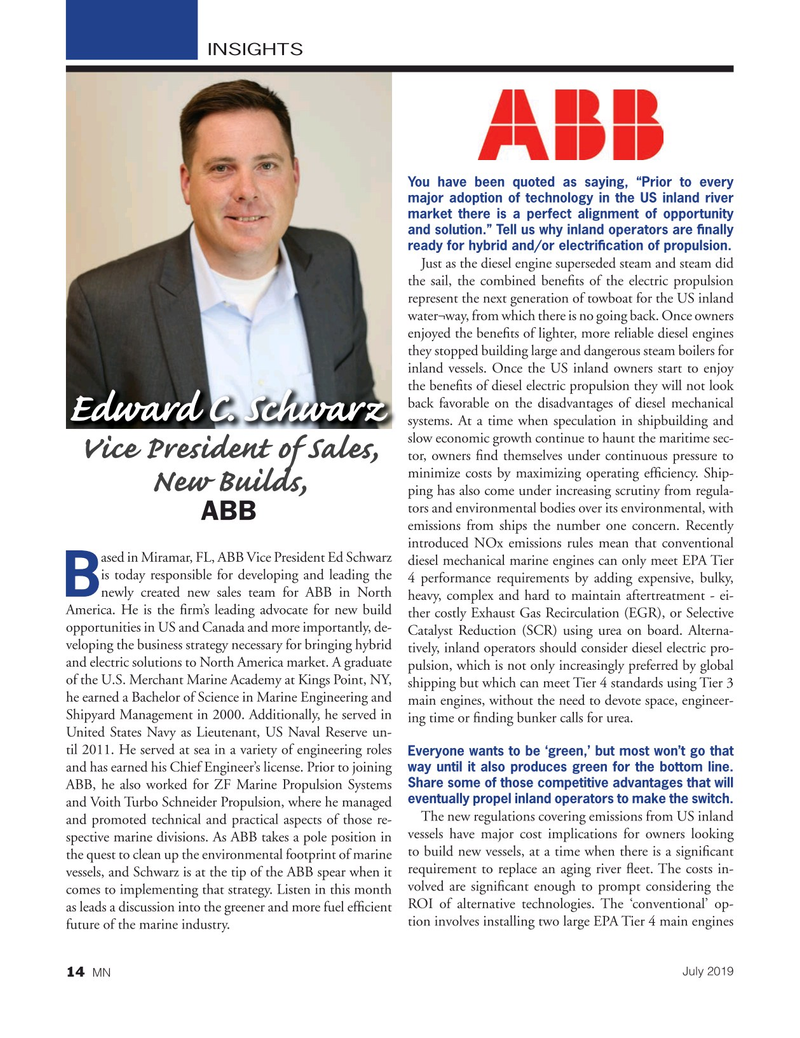
Page 14: of Marine News Magazine (July 2019)
Propulsion Technology
Read this page in Pdf, Flash or Html5 edition of July 2019 Marine News Magazine
INSIGHTS
You have been quoted as saying, “Prior to every major adoption of technology in the US inland river market there is a perfect alignment of opportunity and solution.” Tell us why inland operators are ? nally ready for hybrid and/or electri? cation of propulsion.
Just as the diesel engine superseded steam and steam did the sail, the combined bene? ts of the electric propulsion represent the next generation of towboat for the US inland water¬way, from which there is no going back. Once owners enjoyed the bene? ts of lighter, more reliable diesel engines they stopped building large and dangerous steam boilers for inland vessels. Once the US inland owners start to enjoy the bene? ts of diesel electric propulsion they will not look back favorable on the disadvantages of diesel mechanical
Edward C. Schwarz systems. At a time when speculation in shipbuilding and slow economic growth continue to haunt the maritime sec-
Vice President of Sales, tor, owners ? nd themselves under continuous pressure to minimize costs by maximizing operating ef? ciency. Ship-
New Builds, ping has also come under increasing scrutiny from regula- tors and environmental bodies over its environmental, with
ABB emissions from ships the number one concern. Recently introduced NOx emissions rules mean that conventional ased in Miramar, FL, ABB Vice President Ed Schwarz diesel mechanical marine engines can only meet EPA Tier is today responsible for developing and leading the 4 performance requirements by adding expensive, bulky, newly created new sales team for ABB in North heavy, complex and hard to maintain aftertreatment - ei-
B
America. He is the ? rm’s leading advocate for new build ther costly Exhaust Gas Recirculation (EGR), or Selective opportunities in US and Canada and more importantly, de-
Catalyst Reduction (SCR) using urea on board. Alterna- veloping the business strategy necessary for bringing hybrid tively, inland operators should consider diesel electric pro- and electric solutions to North America market. A graduate pulsion, which is not only increasingly preferred by global of the U.S. Merchant Marine Academy at Kings Point, NY, shipping but which can meet Tier 4 standards using Tier 3 he earned a Bachelor of Science in Marine Engineering and main engines, without the need to devote space, engineer-
Shipyard Management in 2000. Additionally, he served in ing time or ? nding bunker calls for urea.
United States Navy as Lieutenant, US Naval Reserve un- til 2011. He served at sea in a variety of engineering roles
Everyone wants to be ‘green,’ but most won’t go that way until it also produces green for the bottom line. and has earned his Chief Engineer’s license. Prior to joining
Share some of those competitive advantages that will
ABB, he also worked for ZF Marine Propulsion Systems eventually propel inland operators to make the switch.
and Voith Turbo Schneider Propulsion, where he managed
The new regulations covering emissions from US inland and promoted technical and practical aspects of those re- spective marine divisions. As ABB takes a pole position in vessels have major cost implications for owners looking the quest to clean up the environmental footprint of marine to build new vessels, at a time when there is a signi? cant vessels, and Schwarz is at the tip of the ABB spear when it requirement to replace an aging river ? eet. The costs in- comes to implementing that strategy. Listen in this month volved are signi? cant enough to prompt considering the as leads a discussion into the greener and more fuel ef? cient ROI of alternative technologies. The ‘conventional’ op- tion involves installing two large EPA Tier 4 main engines future of the marine industry.
July 2019 14 MN
MN July19 Layout 1-17.indd 14 6/20/2019 9:40:11 AM

 13
13

 15
15
